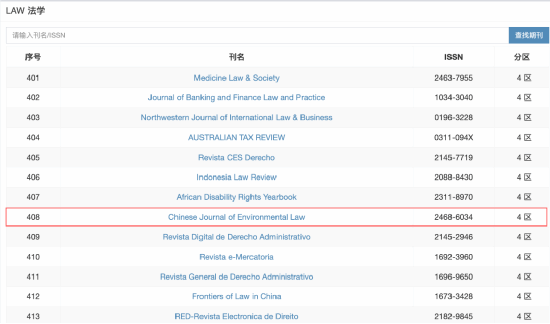On March 20, the 2025 Chinese Academy of Sciences (CAS) journal ranking was officially released. The Chinese Journal of Environmental Law was ranked in the tier 4 of both the “Sociology” major category and the “Law” subcategory.
In 2025, the CAS journal ranking system underwent significant adjustments. The original “Law” major category was expanded into a broader “Sociology” category, which now includes law, political science, and sociology. This restructuring introduced clearer disciplinary divisions and enhanced the rankings’ scope and authority. The inclusion of the Chinese Journal of Environmental Law in this updated system reflects growing recognition of its academic contributions and influence within the field.

This recognition adds to a series of milestones for the journal: its 2024 inclusion in the Law Q3 category of the InCites Journal Citation Reports, its 2023 selection as a listed journal in the China Humanities and Social Sciences Journal AMI Comprehensive Evaluation, and its earlier inclusion in the Emerging Sources Citation Index (ESCI) and the Scopus citation database in 2021.
The Chinese Journal of Environmental Law is the first academic publication in Chinese legal field dedicated to environmental law. Officially launched in 2017, it was co-founded by Professors Qin Tianbao and Ben Boer, who both served as its first editors-in-chief. Since 2024, Professor Qin Tianbao has continued as editor-in-chief, with Professor Benoit Mayer of the University of Reading, UK, serving as executive editor. The journal’s editorial and advisory boards are composed of leading environmental law scholars from around the world. It employs an internationally recognized double-blind peer review process. Since its inception, the journal has published eight volumes (two issues for each volume), establishing itself as a high-quality platform for dialogue and cooperation between Chinese and international scholars. It has become a globally recognized venue for academic communication in environmental law. The journal follows a widely accepted Open Access publishing model (free access guide: https://brill.com/view/journals/cjel/4/2/cjel.4.issue-2.xml).
The journal’s inclusion in the CAS ranking underscores its academic caliber and international influence. It marks a major achievement in advancing the Luojia Green Law spirit, pushing the boundaries of contemporary environmental law research, and significantly contributing to the development and global presence of Chinese environmental law discipline.